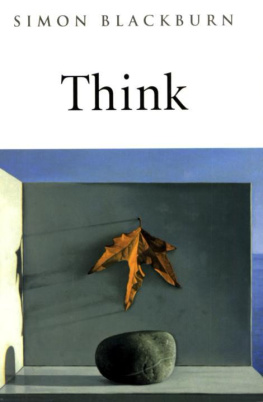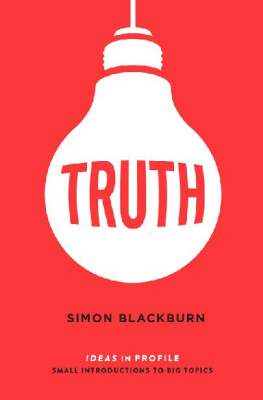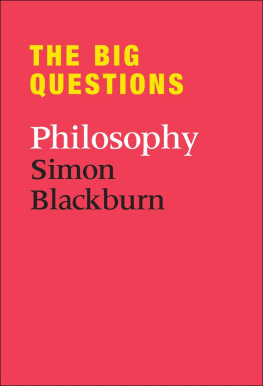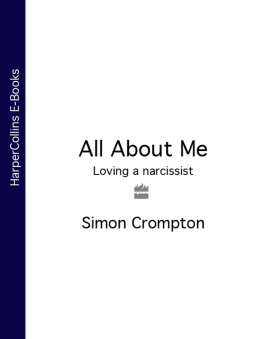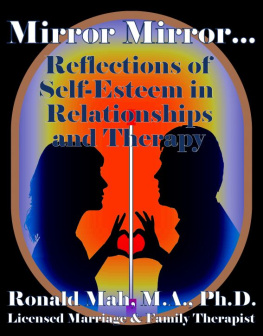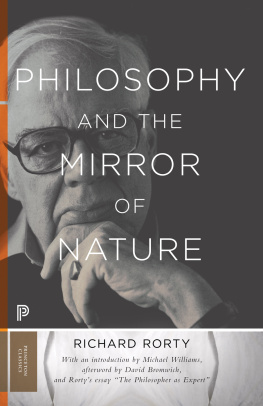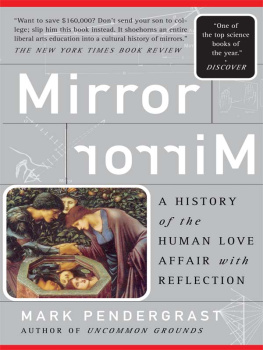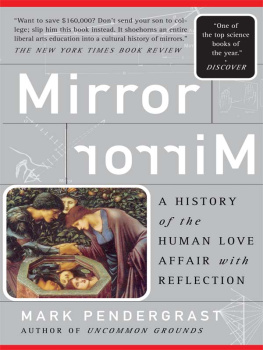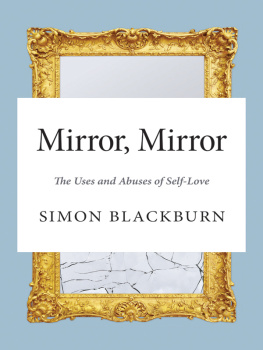
Mirror, Mirror
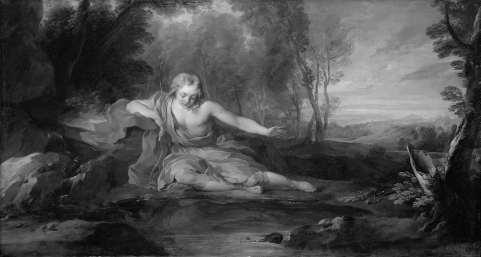
Francois Lemoyne (Le Moine), 16881737, Narcissus contemplates his image mirrored in water. Louvre Museum, Paris, France. Photo Credit: Erich Lessing / Art Resource, NY.
Mirror, Mirror
THE USES AND ABUSES OF SELF-LOVE
Simon Blackburn
PRINCETON UNIVERSITY PRESS
Princeton and Oxford
Copyright 2014 by Simon Blackburn
Requests for permission to reproduce material from this work should be sent to Permissions, Princeton University Press.
Published by Princeton University Press, 41 William Street, Princeton, New Jersey 08540
In the United Kingdom: Princeton University Press, 6 Oxford Street, Woodstock, Oxfordshire OX20 1TW
press.princeton.edu
All Rights Reserved
Library of Congress Cataloging-in-Publication Data
Blackburn, Simon, 1944
Mirror, mirror : the uses and abuses of self-love / Simon Blackburn.
pages cm
Includes bibliographical references and index.
ISBN 978-0-691-16142-6 (hardcover)
1. Self-acceptance. 2. Self-esteem. I. Title.
BF575.S37B54 2014
155.2dc23
2013031309
British Library Cataloging-in-Publication Data is available
This book has been composed in Sabon Next
Printed on acid-free paper.
Printed in the United States of America
10 9 8 7 6 5 4 3 2 1
Sin of self-love possesseth all mine eye
And all my soul and all my every part;
And for this sin there is no remedy,
It is so grounded inward in my heart.
Methinks no face so gracious is as mine,
No shape so true, no truth of such account;
And for myself mine own worth do define,
As I all other in all worths surmount
SHAKESPEARE, SONNET 62
Their vanity was in such good order that they seemed to be quite free of it, and gave themselves no airs; while the praises attending such behavior served to strengthen them in believing they had no faults.
JANE AUSTEN, MANSFIELD PARK
Contents
Preface
There are books that should be read like plays: act 1 precedes act 2 and so on to the end. These unfold a plot; they have a story line, and to appreciate the book, this story line has to be faithfully followed. I am not sure this book is like that; while writing it I have sometimes thought it is more like a piece of cake that tastes better when all the layers are chewed together. Perhaps it is more of a perambulation than a quest or a journey. It is, at any rate, an exploration and a meditation. On the other hand, it does have a moral; in fact, two morals. They each concern the complexity of the notions I talk about: pride, vanity, self-esteem, and their cousins. This complexity bedevils the attitudes we should adopt when these traits rear their heads, and confuse any simple moral reactions to them. But they also bedevil empirical work that sets out, sometimes naively, to chart their consequences for good or ill. There is, therefore, a train of thought, but perhaps it is a train in which one can wander at will from one carriage to another.
My principal debt is to the vast cosmetics company LOral and their iconic advertisement: Because youre worth it. I think of myself as a genial person, so the despair I found welling up whenever I saw this surprised me enough to make me reflect on the themes that are presented here. It is not that I was previously unfamiliar with the vanity of human beings, or even the vanity of human wishes. But there was something particularly blatant about the appeal LOral flaunted that I felt I needed to confront and to understand. It acted like a glimpse into a darker, more wicked world. It is, of course, nothing but the contemporary human world, although I hope not the timeless human world. I give something of my own diagnosis of my reaction in the course of the work.
My second debt is to the context of LOrals appeal: the generation that over the years has so shamelessly implemented the idea that greed is good, that there is no such thing as society, that, because they are worth it, their predations on the common good give them no more than their due. The many bankers, CEOs, remuneration committees, hedge fund managers, tax lawyers, civil servants scuttling through the revolving door into the arms of the great accountancy companies, private medical providers, or arms manufacturersthe many politicians of all stripes with inherited wealth castigating the inadequacies of the poorall of them so splendidly and shamelessly illustrate the spirit of the age that exaggeration is impossible, parody and satire are silenced (or even co-opted, as we see later), and even anger gives way to blank despair. Doubtless some of us would like to hang these mental and moral deficients from real lampposts, but for the law-abiding among us, verbal ones will have to serve instead.
So, over several years, whenever I had the leisure from more scholarly and perhaps professional pursuits, I found myself jotting down the thoughts that, eventually, I felt able to string together here. I hadnt the confidence to deliver them to the huge variety of fellow workers and audiences that academics like to cite, usually insincerely, as having helped them. In fact, apart from those I have mentioned already, I am only conscious, but extremely so, of the helpful comments of Princeton University Presss readers. I am thankful as well for the support of my agent, Catherine Clarke, and the encouragement and input of Princeton University Presss editor Rob Tempio, copy editor Cathy Slovensky, and, as always, my wife, Angela. I simply hope that there are other readers who echo some of these ideas, and even ones who come to do so.
Mirror, Mirror
Introduction
This is first an essay about emotions and attitudes that include some estimate of the self, such as pride, self-esteem, vanity, arrogance, shame, humility, embarrassment, resentment, and indignation. It is also about some qualities that bear on these emotions: our integrity, sincerity, or authenticity. I am concerned with the way these emotions and qualities manifest themselves in human life in general, and in the modern world in particular. The essay is therefore what the great German philosopher Immanuel Kant (17241804), never afraid of a grand title, would have called an exercise in pragmatic anthropology:
Physiological knowledge of the human being concerns the investigation of what nature makes of the human being; pragmatic, the investigation of what he as a free-acting being makes of himself, or can and should make of himself.
Kant here echoes an older theological tradition that while other animals have their settled natures, human beings are free to make of themselves what they will. So this book is about what we make of ourselves, or can and should make of ourselves.
There is a melancholy pleasure in contemplating the wandering infirmities to which we are all prone. A more strenuous moralist than myself might preach to arm us against them, but I have little such ambition. According to the Scottish philosopher David Hume (171176), the merit of delivering true general precepts in ethics is indeed very small. Whoever recommends any moral virtues, really does no more than is implied in the terms themselves. I pretty much agree. By the time we have grown up, we have learned that courage, justice, kindness, honesty, modesty, open-mindedness, and many other traits are virtues and commendable, and that others such as selfishness, malevolence, laziness, dishonesty, inconstancy, vanity, and pigheadedness are the reverse. When we learn what words others are using about us, we immediately know whether they are praising us or criticizing us. In morality, it is usually not knowledge we lack but the ability to bend our will to it, although there is room for puzzles and dilemmas when morality speaks with two voices. From a rather different angle to Humes, the Church historian Owen Chadwick, poring over the denunciations of sin in one of the fathers of the monastic tradition, confesses,
Next page

